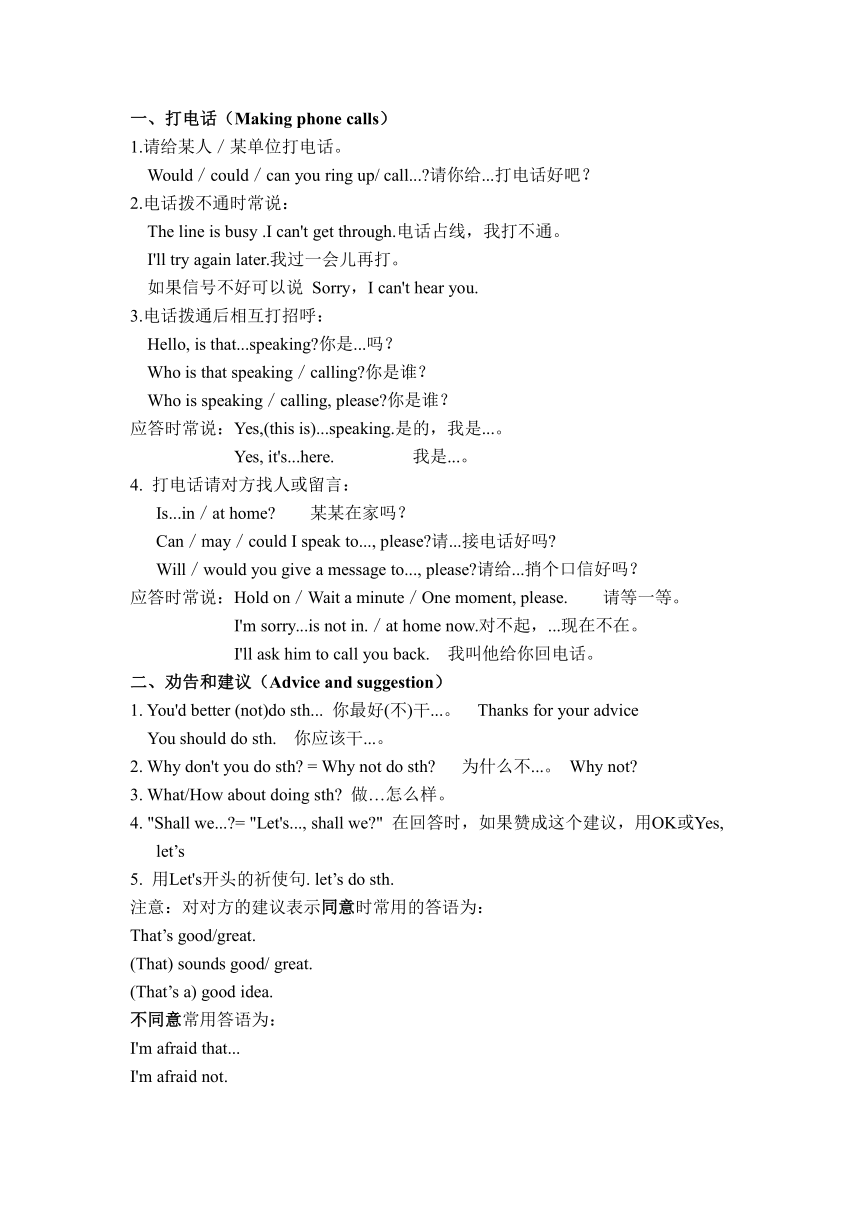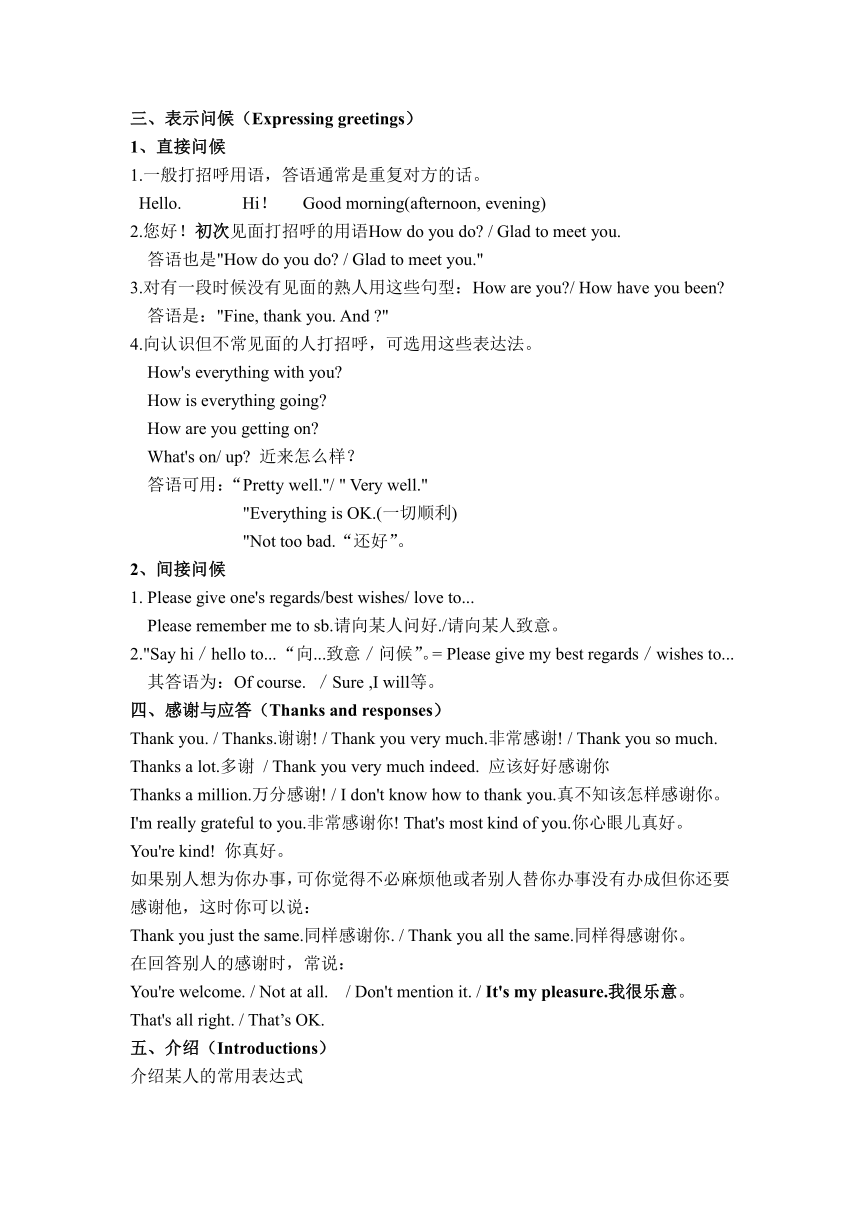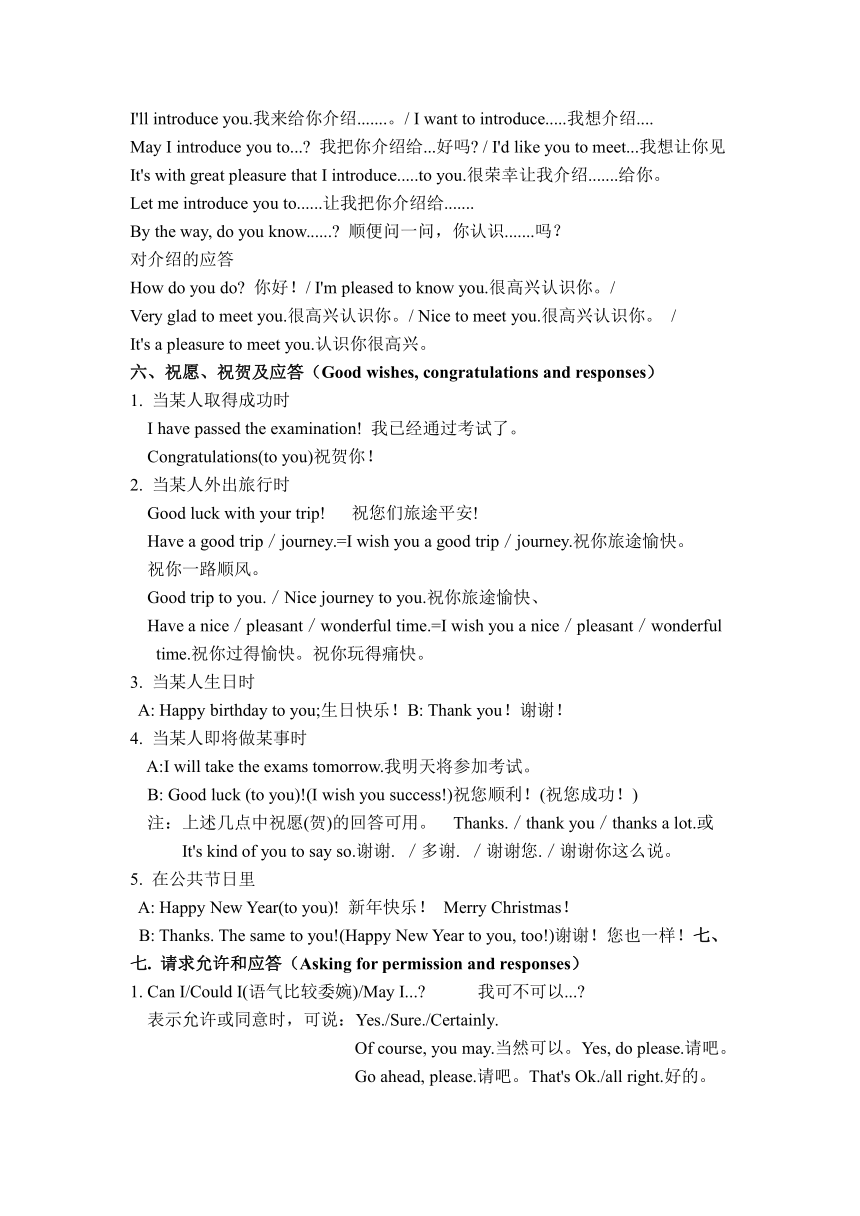中考英语复习:情景交际讲解
图片预览



文档简介
一、打电话(Making phone calls)
1.请给某人/某单位打电话。
Would/could/can you ring up/ call... 请你给...打电话好吧?
2.电话拨不通时常说:
The line is busy .I can't get through.电话占线,我打不通。
I'll try again later.我过一会儿再打。
如果信号不好可以说 Sorry,I can't hear you.
3.电话拨通后相互打招呼:
Hello, is that...speaking 你是...吗?
Who is that speaking/calling 你是谁?
Who is speaking/calling, please 你是谁?
应答时常说:Yes,(this is)...speaking.是的,我是...。
Yes, it's...here. 我是...。
4. 打电话请对方找人或留言:
Is...in/at home 某某在家吗?
Can/may/could I speak to..., please 请...接电话好吗
Will/would you give a message to..., please 请给...捎个口信好吗?
应答时常说:Hold on/Wait a minute/One moment, please. 请等一等。
I'm sorry...is not in./at home now.对不起,...现在不在。
I'll ask him to call you back. 我叫他给你回电话。
二、劝告和建议(Advice and suggestion)
1. You'd better (not)do sth... 你最好(不)干...。 Thanks for your advice
You should do sth. 你应该干...。
2. Why don't you do sth = Why not do sth 为什么不...。 Why not
3. What/How about doing sth 做…怎么样。
4. "Shall we... = "Let's..., shall we " 在回答时,如果赞成这个建议,用OK或Yes, let’s
5. 用Let's开头的祈使句. let’s do sth.
注意:对对方的建议表示同意时常用的答语为:
That’s good/great.
(That) sounds good/ great.
(That’s a) good idea.
不同意常用答语为:
I'm afraid that...
I'm afraid not.
三、表示问候(Expressing greetings)
1、直接问候
1.一般打招呼用语,答语通常是重复对方的话。
Hello. Hi! Good morning(afternoon, evening)
2.您好!初次见面打招呼的用语How do you do / Glad to meet you.
答语也是"How do you do / Glad to meet you."
3.对有一段时候没有见面的熟人用这些句型:How are you / How have you been
答语是:"Fine, thank you. And "
4.向认识但不常见面的人打招呼,可选用这些表达法。
How's everything with you
How is everything going
How are you getting on
What's on/ up 近来怎么样?
答语可用:“Pretty well."/ " Very well."
"Everything is OK.(一切顺利)
"Not too bad.“还好”。
2、间接问候
1. Please give one's regards/best wishes/ love to...
Please remember me to sb.请向某人问好./请向某人致意。
2."Say hi/hello to... “向...致意/问候”。= Please give my best regards/wishes to...其答语为:Of course. /Sure ,I will等。
四、感谢与应答(Thanks and responses)
Thank you. / Thanks.谢谢! / Thank you very much.非常感谢! / Thank you so much.
Thanks a lot.多谢 / Thank you very much indeed. 应该好好感谢你
Thanks a million.万分感谢! / I don't know how to thank you.真不知该怎样感谢你。I'm really grateful to you.非常感谢你! That's most kind of you.你心眼儿真好。
You're kind! 你真好。
如果别人想为你办事,可你觉得不必麻烦他或者别人替你办事没有办成但你还要感谢他,这时你可以说:
Thank you just the same.同样感谢你. / Thank you all the same.同样得感谢你。
在回答别人的感谢时,常说:
You're welcome. / Not at all. / Don't mention it. / It's my pleasure.我很乐意。
That's all right. / That’s OK.
五、介绍(Introductions)
介绍某人的常用表达式
I'll introduce you.我来给你介绍.......。/ I want to introduce.....我想介绍....
May I introduce you to... 我把你介绍给...好吗 / I'd like you to meet...我想让你见It's with great pleasure that I introduce.....to you.很荣幸让我介绍.......给你。
Let me introduce you to......让我把你介绍给.......
By the way, do you know...... 顺便问一问,你认识.......吗?
对介绍的应答
How do you do 你好!/ I'm pleased to know you.很高兴认识你。/
Very glad to meet you.很高兴认识你。/ Nice to meet you.很高兴认识你。 /
It's a pleasure to meet you.认识你很高兴。
六、祝愿、祝贺及应答(Good wishes, congratulations and responses)
1. 当某人取得成功时
I have passed the examination! 我已经通过考试了。
Congratulations(to you)祝贺你!
2. 当某人外出旅行时
Good luck with your trip! 祝您们旅途平安!
Have a good trip/journey.=I wish you a good trip/journey.祝你旅途愉快。
祝你一路顺风。
Good trip to you./Nice journey to you.祝你旅途愉快、
Have a nice/pleasant/wonderful time.=I wish you a nice/pleasant/wonderful time.祝你过得愉快。祝你玩得痛快。
3. 当某人生日时
A: Happy birthday to you;生日快乐!B: Thank you!谢谢!
4. 当某人即将做某事时
A:I will take the exams tomorrow.我明天将参加考试。
B: Good luck (to you)!(I wish you success!)祝您顺利!(祝您成功!)
注:上述几点中祝愿(贺)的回答可用。 Thanks./thank you/thanks a lot.或
It's kind of you to say so.谢谢. /多谢. /谢谢您./谢谢你这么说。
5. 在公共节日里
A: Happy New Year(to you)! 新年快乐! Merry Christmas!
B: Thanks. The same to you!(Happy New Year to you, too!)谢谢!您也一样!七、七. 请求允许和应答(Asking for permission and responses)
1. Can I/Could I(语气比较委婉)/May I... 我可不可以...
表示允许或同意时,可说:Yes./Sure./Certainly.
Of course, you may.当然可以。Yes, do please.请吧。Go ahead, please.请吧。That's Ok./all right.好的。
不允许或不同意时,可说:No, pleased don't.请不要。
I'm sorry you can't.对不起,你不可以...
I'm sorry, but...对不起,但是...。
You'd better not...你最好别...。
2. Do you mind if I do...= Would you mind doing
表示“允许/不介意”,常说:No, I don't mind.
Certainly not / Of course not.
No, go ahead. 不介意,你干吧。
Not at all. 一点也不介意。
表示“不允许/介意”时,常说:I'm sorry you can't...很抱歉,你不能...。
I'm afraid....恐怕....I'm afraid it's not allowed. 恐怕这是不允许的。
You’d better not
3. I wonder if I could/can... 我想知道我能否...
如果允许,常说:Sure, go ahead./Yes, please do.可以,请吧。 Yes. /Of course./Certainly. 当然可以。
如果不允许,可以说:I'm sorry, but... 对不起,...I'm afraid not. 恐怕不行。
No, please don't. 请不要......。You'd better not... 你最好别....。
八、请求(Requests)
Would, Will, Would(Will)you please... /Would you like... 来表达。
表示同意应答:Yes, I'd like to=Yes, I'd love to / With pleasure.十分愿意。
表示不同意应答:I'd like (love)to, but I'm busy,我很想,但我很忙。/
I'm sorry, but I'm busy.对不起,我很忙。
I'm afraid not恐怕不能。
九、道歉和应答(Apologize and responses)
I'm really sorry for..... / 我真为.......感到抱歉。
I'm so sorry. It's all my fault. 我十分抱歉,都是我的过错
I must make an apology for......我必须对........表示道歉 。
Please forgive me for......请原谅我.......
对道歉的反应
Never mind, it doesn't really matter.没关系,真的不要紧。
Please don't worry about it.请别为这事担心。
It's nothing serious.没有什么关系。
That's all right.没关系。
Forget thinking of it.别在想它了
十、邀请与应答(Invitation and responses)
1. 用一般疑问句形式
Will / would / can / could you come to... 表示“请您来...好吗 ”。
Yes, I'd like(love) to好的,我愿意。
Yes, it's very kind / nice of you to invite me. / Yes, it's very kind of you.
2. 用陈述句形式
I'd like you to come to....
委婉拒绝表达法:I'd love to....I'm afraid我想去,恐怕...,Thank you for inviting me.)
It's very kind of you to invite me, but I'm busy.
十一、提供帮助和应答(Offers and responses)
Can I help you = What can I do for you = Is there anything (else) I can do (for you)
Thank you./ Thanks a lot/ Thank you very much. 谢谢。
Yes, please./ Thanks, please
Thank you for your help.
如果谢绝帮助,可以说: No, thanks.
No, I can do it, but thank you all the same.
十二、看病时病交际用语
1. 医生询问病情时的常用语
What's wrong/the matter/ the trouble with you
Is there anything wrong with you
2. 病人诉说病情时的常用语
I feel terrible/ bad/ ill sick. 我感到很不舒服。
I don't feel well. /I'm not feeling well.我感到不舒服。
There is something wrong with... 我的...有毛病。
I have / have got.... 我觉得...痛。
4. 医生看完病后对病人提出医嘱时的常用语
It's nothing serious. 病不重。不要紧。
You'd better have a good rest. 你最好好好休息休息。
Take this medicine three times a day. 这药每天吃三次。
Drink plenty of water and have a good rest.
You'll be well/ all right soon. 不久你会好的。
十三 、谈论天气情况
What's the weather like today = How’s the weather today
应答时:It's fine /warm /cold /hot ...或It's going to be fine /warm/cold /hot ...
十四 、问路及应答的交际用语
Excuse me. Where is…/ How can I get to…/ Can you tell me the way to ...
It's about...meters from here.
Go down/along this street.
Turn right/left at the first/second crossing.
You'd better take a taxi/minibus/No. 5 bus...
十五 、就餐时的交际用语
1. 就餐时,当主人询问客人想吃/喝点什么时,主人常说:
Would you like sth.(to eat / to drink)
2. 就餐时,当主人主动请客人吃/喝点东西时,主人常说:
Help yourself to...
3. 当客人表示愿意或同意吃/喝点东西时,常回答:
Yes, please,好的。/ I'd like...我想来点...。
Well, just a little, please. 好的,请来一点儿。
4. 当客人表示不想吃/喝东西或表示已经吃饱/喝好了时,常回答:
No, thanks, 谢谢,不要了。/ Thank you, I've had enough. 谢谢,我已经够了。I'm full, thank you. 谢谢,我吃饱了。
十六、赞美和恭维及应答(Making Compliments and Responses)
It's beautiful. 真漂亮! / How clever of you! 你好聪明哦!/ You look very smart today! 你今天看上去好神气哦! / What a wonderful house! 你的房子好漂亮哦!/Your wife is beautiful. 你的妻子真漂亮。/ You gave an excellent speech.你的演讲真精彩。 / Your car is nice.你的车真漂亮。
Oh, I'm glad you like it. 哦,你喜欢,我真高兴。/ I'm glad you think so.
I'm delighted you think so. 你能这样认为我真高兴。/ Oh, thank you.哦,谢谢!
I'm glad to hear that.听到这我真高兴。/ Thanks for saying so.谢谢你这样说。
十七、约会的交际用语
1. 询问对方是否有空:
Will you be free (tonight/ tomorrow/...) 你(今晚/明天 ...)有空吗
肯定回答:Yes, I'll be free (tonight / tomorrow...). 我(今晚/明天...)有空。
否定回答:No, I won't be free(tonight/ tomorrow...).不,(今晚/明天...)没有空。
比较客气委婉的否定回答:
I'm afraid not. (I'm afraid I'm not free tonight/tomorrow...). 恐怕没有空。
2. 询问约会的时间、地点:
What time shall we meet 我们什么时候会面呢
Shall we meet at 7:30 p.m. at the gate 我们下午七点半大门口碰头好吗
I'll meet you at the theatre at 7:30 p.m. 我会在七点半在剧场见你。
十八、表示遗憾、同情的交际用语
1. be afraid that.......恐怕......
2. It's a pity(that).....
3. What a pity/shame!
表示同情时常用I'm sorry to hear......
十九、表示判断和意见
What do you think of.... =How do you like....
1.请给某人/某单位打电话。
Would/could/can you ring up/ call... 请你给...打电话好吧?
2.电话拨不通时常说:
The line is busy .I can't get through.电话占线,我打不通。
I'll try again later.我过一会儿再打。
如果信号不好可以说 Sorry,I can't hear you.
3.电话拨通后相互打招呼:
Hello, is that...speaking 你是...吗?
Who is that speaking/calling 你是谁?
Who is speaking/calling, please 你是谁?
应答时常说:Yes,(this is)...speaking.是的,我是...。
Yes, it's...here. 我是...。
4. 打电话请对方找人或留言:
Is...in/at home 某某在家吗?
Can/may/could I speak to..., please 请...接电话好吗
Will/would you give a message to..., please 请给...捎个口信好吗?
应答时常说:Hold on/Wait a minute/One moment, please. 请等一等。
I'm sorry...is not in./at home now.对不起,...现在不在。
I'll ask him to call you back. 我叫他给你回电话。
二、劝告和建议(Advice and suggestion)
1. You'd better (not)do sth... 你最好(不)干...。 Thanks for your advice
You should do sth. 你应该干...。
2. Why don't you do sth = Why not do sth 为什么不...。 Why not
3. What/How about doing sth 做…怎么样。
4. "Shall we... = "Let's..., shall we " 在回答时,如果赞成这个建议,用OK或Yes, let’s
5. 用Let's开头的祈使句. let’s do sth.
注意:对对方的建议表示同意时常用的答语为:
That’s good/great.
(That) sounds good/ great.
(That’s a) good idea.
不同意常用答语为:
I'm afraid that...
I'm afraid not.
三、表示问候(Expressing greetings)
1、直接问候
1.一般打招呼用语,答语通常是重复对方的话。
Hello. Hi! Good morning(afternoon, evening)
2.您好!初次见面打招呼的用语How do you do / Glad to meet you.
答语也是"How do you do / Glad to meet you."
3.对有一段时候没有见面的熟人用这些句型:How are you / How have you been
答语是:"Fine, thank you. And "
4.向认识但不常见面的人打招呼,可选用这些表达法。
How's everything with you
How is everything going
How are you getting on
What's on/ up 近来怎么样?
答语可用:“Pretty well."/ " Very well."
"Everything is OK.(一切顺利)
"Not too bad.“还好”。
2、间接问候
1. Please give one's regards/best wishes/ love to...
Please remember me to sb.请向某人问好./请向某人致意。
2."Say hi/hello to... “向...致意/问候”。= Please give my best regards/wishes to...其答语为:Of course. /Sure ,I will等。
四、感谢与应答(Thanks and responses)
Thank you. / Thanks.谢谢! / Thank you very much.非常感谢! / Thank you so much.
Thanks a lot.多谢 / Thank you very much indeed. 应该好好感谢你
Thanks a million.万分感谢! / I don't know how to thank you.真不知该怎样感谢你。I'm really grateful to you.非常感谢你! That's most kind of you.你心眼儿真好。
You're kind! 你真好。
如果别人想为你办事,可你觉得不必麻烦他或者别人替你办事没有办成但你还要感谢他,这时你可以说:
Thank you just the same.同样感谢你. / Thank you all the same.同样得感谢你。
在回答别人的感谢时,常说:
You're welcome. / Not at all. / Don't mention it. / It's my pleasure.我很乐意。
That's all right. / That’s OK.
五、介绍(Introductions)
介绍某人的常用表达式
I'll introduce you.我来给你介绍.......。/ I want to introduce.....我想介绍....
May I introduce you to... 我把你介绍给...好吗 / I'd like you to meet...我想让你见It's with great pleasure that I introduce.....to you.很荣幸让我介绍.......给你。
Let me introduce you to......让我把你介绍给.......
By the way, do you know...... 顺便问一问,你认识.......吗?
对介绍的应答
How do you do 你好!/ I'm pleased to know you.很高兴认识你。/
Very glad to meet you.很高兴认识你。/ Nice to meet you.很高兴认识你。 /
It's a pleasure to meet you.认识你很高兴。
六、祝愿、祝贺及应答(Good wishes, congratulations and responses)
1. 当某人取得成功时
I have passed the examination! 我已经通过考试了。
Congratulations(to you)祝贺你!
2. 当某人外出旅行时
Good luck with your trip! 祝您们旅途平安!
Have a good trip/journey.=I wish you a good trip/journey.祝你旅途愉快。
祝你一路顺风。
Good trip to you./Nice journey to you.祝你旅途愉快、
Have a nice/pleasant/wonderful time.=I wish you a nice/pleasant/wonderful time.祝你过得愉快。祝你玩得痛快。
3. 当某人生日时
A: Happy birthday to you;生日快乐!B: Thank you!谢谢!
4. 当某人即将做某事时
A:I will take the exams tomorrow.我明天将参加考试。
B: Good luck (to you)!(I wish you success!)祝您顺利!(祝您成功!)
注:上述几点中祝愿(贺)的回答可用。 Thanks./thank you/thanks a lot.或
It's kind of you to say so.谢谢. /多谢. /谢谢您./谢谢你这么说。
5. 在公共节日里
A: Happy New Year(to you)! 新年快乐! Merry Christmas!
B: Thanks. The same to you!(Happy New Year to you, too!)谢谢!您也一样!七、七. 请求允许和应答(Asking for permission and responses)
1. Can I/Could I(语气比较委婉)/May I... 我可不可以...
表示允许或同意时,可说:Yes./Sure./Certainly.
Of course, you may.当然可以。Yes, do please.请吧。Go ahead, please.请吧。That's Ok./all right.好的。
不允许或不同意时,可说:No, pleased don't.请不要。
I'm sorry you can't.对不起,你不可以...
I'm sorry, but...对不起,但是...。
You'd better not...你最好别...。
2. Do you mind if I do...= Would you mind doing
表示“允许/不介意”,常说:No, I don't mind.
Certainly not / Of course not.
No, go ahead. 不介意,你干吧。
Not at all. 一点也不介意。
表示“不允许/介意”时,常说:I'm sorry you can't...很抱歉,你不能...。
I'm afraid....恐怕....I'm afraid it's not allowed. 恐怕这是不允许的。
You’d better not
3. I wonder if I could/can... 我想知道我能否...
如果允许,常说:Sure, go ahead./Yes, please do.可以,请吧。 Yes. /Of course./Certainly. 当然可以。
如果不允许,可以说:I'm sorry, but... 对不起,...I'm afraid not. 恐怕不行。
No, please don't. 请不要......。You'd better not... 你最好别....。
八、请求(Requests)
Would, Will, Would(Will)you please... /Would you like... 来表达。
表示同意应答:Yes, I'd like to=Yes, I'd love to / With pleasure.十分愿意。
表示不同意应答:I'd like (love)to, but I'm busy,我很想,但我很忙。/
I'm sorry, but I'm busy.对不起,我很忙。
I'm afraid not恐怕不能。
九、道歉和应答(Apologize and responses)
I'm really sorry for..... / 我真为.......感到抱歉。
I'm so sorry. It's all my fault. 我十分抱歉,都是我的过错
I must make an apology for......我必须对........表示道歉 。
Please forgive me for......请原谅我.......
对道歉的反应
Never mind, it doesn't really matter.没关系,真的不要紧。
Please don't worry about it.请别为这事担心。
It's nothing serious.没有什么关系。
That's all right.没关系。
Forget thinking of it.别在想它了
十、邀请与应答(Invitation and responses)
1. 用一般疑问句形式
Will / would / can / could you come to... 表示“请您来...好吗 ”。
Yes, I'd like(love) to好的,我愿意。
Yes, it's very kind / nice of you to invite me. / Yes, it's very kind of you.
2. 用陈述句形式
I'd like you to come to....
委婉拒绝表达法:I'd love to....I'm afraid我想去,恐怕...,Thank you for inviting me.)
It's very kind of you to invite me, but I'm busy.
十一、提供帮助和应答(Offers and responses)
Can I help you = What can I do for you = Is there anything (else) I can do (for you)
Thank you./ Thanks a lot/ Thank you very much. 谢谢。
Yes, please./ Thanks, please
Thank you for your help.
如果谢绝帮助,可以说: No, thanks.
No, I can do it, but thank you all the same.
十二、看病时病交际用语
1. 医生询问病情时的常用语
What's wrong/the matter/ the trouble with you
Is there anything wrong with you
2. 病人诉说病情时的常用语
I feel terrible/ bad/ ill sick. 我感到很不舒服。
I don't feel well. /I'm not feeling well.我感到不舒服。
There is something wrong with... 我的...有毛病。
I have / have got.... 我觉得...痛。
4. 医生看完病后对病人提出医嘱时的常用语
It's nothing serious. 病不重。不要紧。
You'd better have a good rest. 你最好好好休息休息。
Take this medicine three times a day. 这药每天吃三次。
Drink plenty of water and have a good rest.
You'll be well/ all right soon. 不久你会好的。
十三 、谈论天气情况
What's the weather like today = How’s the weather today
应答时:It's fine /warm /cold /hot ...或It's going to be fine /warm/cold /hot ...
十四 、问路及应答的交际用语
Excuse me. Where is…/ How can I get to…/ Can you tell me the way to ...
It's about...meters from here.
Go down/along this street.
Turn right/left at the first/second crossing.
You'd better take a taxi/minibus/No. 5 bus...
十五 、就餐时的交际用语
1. 就餐时,当主人询问客人想吃/喝点什么时,主人常说:
Would you like sth.(to eat / to drink)
2. 就餐时,当主人主动请客人吃/喝点东西时,主人常说:
Help yourself to...
3. 当客人表示愿意或同意吃/喝点东西时,常回答:
Yes, please,好的。/ I'd like...我想来点...。
Well, just a little, please. 好的,请来一点儿。
4. 当客人表示不想吃/喝东西或表示已经吃饱/喝好了时,常回答:
No, thanks, 谢谢,不要了。/ Thank you, I've had enough. 谢谢,我已经够了。I'm full, thank you. 谢谢,我吃饱了。
十六、赞美和恭维及应答(Making Compliments and Responses)
It's beautiful. 真漂亮! / How clever of you! 你好聪明哦!/ You look very smart today! 你今天看上去好神气哦! / What a wonderful house! 你的房子好漂亮哦!/Your wife is beautiful. 你的妻子真漂亮。/ You gave an excellent speech.你的演讲真精彩。 / Your car is nice.你的车真漂亮。
Oh, I'm glad you like it. 哦,你喜欢,我真高兴。/ I'm glad you think so.
I'm delighted you think so. 你能这样认为我真高兴。/ Oh, thank you.哦,谢谢!
I'm glad to hear that.听到这我真高兴。/ Thanks for saying so.谢谢你这样说。
十七、约会的交际用语
1. 询问对方是否有空:
Will you be free (tonight/ tomorrow/...) 你(今晚/明天 ...)有空吗
肯定回答:Yes, I'll be free (tonight / tomorrow...). 我(今晚/明天...)有空。
否定回答:No, I won't be free(tonight/ tomorrow...).不,(今晚/明天...)没有空。
比较客气委婉的否定回答:
I'm afraid not. (I'm afraid I'm not free tonight/tomorrow...). 恐怕没有空。
2. 询问约会的时间、地点:
What time shall we meet 我们什么时候会面呢
Shall we meet at 7:30 p.m. at the gate 我们下午七点半大门口碰头好吗
I'll meet you at the theatre at 7:30 p.m. 我会在七点半在剧场见你。
十八、表示遗憾、同情的交际用语
1. be afraid that.......恐怕......
2. It's a pity(that).....
3. What a pity/shame!
表示同情时常用I'm sorry to hear......
十九、表示判断和意见
What do you think of.... =How do you like....
同课章节目录
- 词法
- 名词
- 动词和动词短语
- 动词语态
- 动词时态
- 助动词和情态动词
- 非谓语动词
- 冠词
- 代词
- 数词和量词
- 形容词副词及其比较等级
- 介词和介词短语
- 连词和感叹词
- 构词法
- 相似、相近词比较
- 句法
- 陈述句
- 一般疑问句和否定疑问句
- 特殊疑问句及选择疑问句
- 反意疑问句
- 存在句(There be句型)
- 宾语从句
- 定语从句
- 状语从句
- 主谓一致问题
- 简单句
- 并列句
- 复合句
- 主谓一致
- 主、表语从句
- 名词性从句
- 直接引语和间接引语
- 虚拟语气
- 感叹句
- 强调句
- 倒装句
- 祈使句
- 句子的成分
- 句子的分类
- 题型专区
- 单项选择部分
- 易错题
- 完形填空
- 阅读理解
- 词汇练习
- 听说训练
- 句型转换
- 补全对话
- 短文改错
- 翻译
- 书面表达
- 任务型阅读
- 语法填空
- 其他资料
